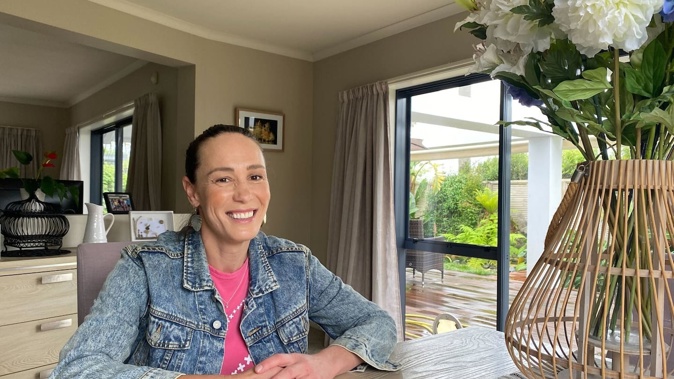
This article discusses suicide and mental health issues. If you need support, helpline information can be found at the bottom of this story.
At age 27, Lynda Hills tried to take her own life in Tauranga after years of struggling with her mental health. She was left critically injured. Now 43, she’s a mum living in Hamilton and researching suicide prevention. She recently returned to the Bay of Plenty to share publicly, for the first time, her story of finding hope.
Growing up, Lynda Hills always struggled with her mental health.
She recalls having her first suicidal thought aged 8 or 9.
She was a good student but the challenges continued on and off through school, and she saw her first counsellor at 19.
In the eight years that followed, she would see psychologists and psychiatrists, try prescription medication and alternative therapies, and spend time in a mental health facility and a Christian respite centre.
“Pretty much you name it, I tried it,” she told the Bay of Plenty Times.
“My sole focus was trying to get better.”
 Lynda Hills lived in Mount Maunganui for about 10 years. Photo / Megan Wilson
Lynda Hills lived in Mount Maunganui for about 10 years. Photo / Megan Wilson
After dropping out of university three times, she graduated with a Bachelor of Arts in Te Reo Māori and mathematics, then studied primary school teaching.
Three weeks into her first fulltime teaching job in Tauranga in 2008, she found herself at a crisis point.
“I was not coping at all.”
She was admitted to a mental health facility and discharged after six weeks.
Friends helped her find relief teaching work, but her health went downhill after a bad break-up.
Her worried mum encouraged her to see a psychologist but Hills feared this would lead to being readmitted, which she felt she could not bear.
At this point, she had been battling bulimia, anxiety and depression for more than eight years.
She attempted suicide in 2009 at age 27.
The attempt left her critically injured in Tauranga Hospital and facing a “10% chance of survival”.
In intensive care, Hills said she had a “strange … near-death experience”.
“It felt like a force came through me …”
It “took away” the suicidal thoughts that had plagued her for so long.
But she faced a long physical recovery.
Hills spent more than seven months in hospital and, over the years, has had 42 surgeries. She had to learn to walk again.
“According to ACC, I’m “69% permanently disabled.”
‘I love my life’
She shared her story publicly for the first time at a free community talk in Pāpāmoa on April 4 about hope beyond suicide.
Today, Hills is a mum to two sons – Seneca, 5, and Ezekiel, 3. They love going to the beach together.
Mentally, she feels “happy” and “grateful”.
“I love my life.”
Health issues had stopped her return to teaching, but a discussion with a professor about life with disabilities set her on a new career path.
She said she had stopped using disabled parking, despite holding a permit, because people yelled at her when they saw she could walk.
“It was a coping strategy … (I) tried so hard to be normal and fit in.”
The professor told her many disabled people hid their pain or disability.
“That blew my mind, that meeting, so I started using my permit.”
She got her master’s in disability and inclusion studies, and has started a PhD at Auckland University.
She researches suicide, including the risks and benefits of common treatments used for suicide prevention such as antidepressant and antipsychotic medication.
After graduating, she hoped to collaborate with medical professionals to create educational material focused on suicide prevention, to support “frontline” prescribers.
She hoped to one day also produce material for patients and support people.
Her lived experience has informed her research and goals.
In retrospect, she recognised she had other options apart from attempting suicide.
Hills said she was told if she took medication, she would feel “a little bit worse” for two or three weeks but would then feel better.
“What I wished that I’d done is … say ‘I don’t have two to three weeks in me’."
She said a more “collaborative” relationship between patients and professionals would have been helpful, “where we can both bring our expertise”.
External support for her mother would have also helped Hills feel like less of “a burden”.
She wished she had been encouraged to “have a voice” in the facility she was admitted to.
Her “dream” was to start a charitable trust to establish a whare or healing centre near the water, that could be an alternative to other mental health facilities in situations like hers.
Where to get help:• Lifeline: Call 0800 543 354 or text 4357 (HELP) (available 24/7)
• Suicide Crisis Helpline: Call 0508 828 865 (0508 TAUTOKO) (available 24/7)
• Youth services: (06) 3555 906
• Youthline: Call 0800 376 633 or text 234
• What's Up: Call 0800 942 8787 (11am to 11pm) or webchat (11am to 10.30pm)
• Depression helpline: Call 0800 111 757 or text 4202 (available 24/7)
• Helpline: Need to talk? Call or text 1737
• Aoake te Rā (Bereaved by Suicide Service): Call 0800 000053 or contact [email protected]
If it is an emergency and you feel like you or someone else is at risk, call 111.
Megan Wilson is a health and general news reporter for the Bay of Plenty Times and Rotorua Daily Post. She has been a journalist since 2021.
Take your Radio, Podcasts and Music with you









